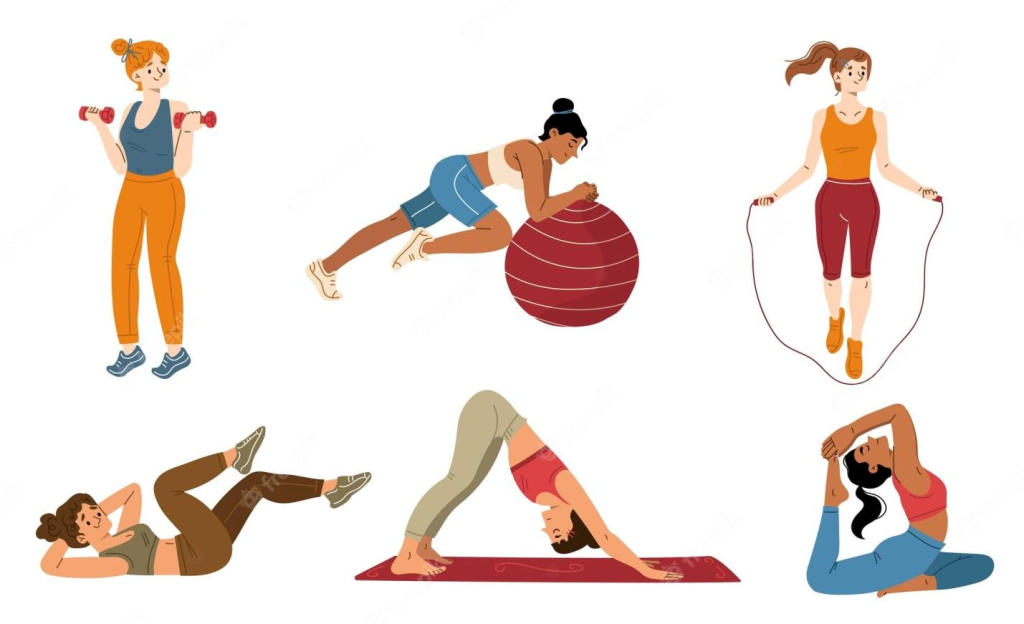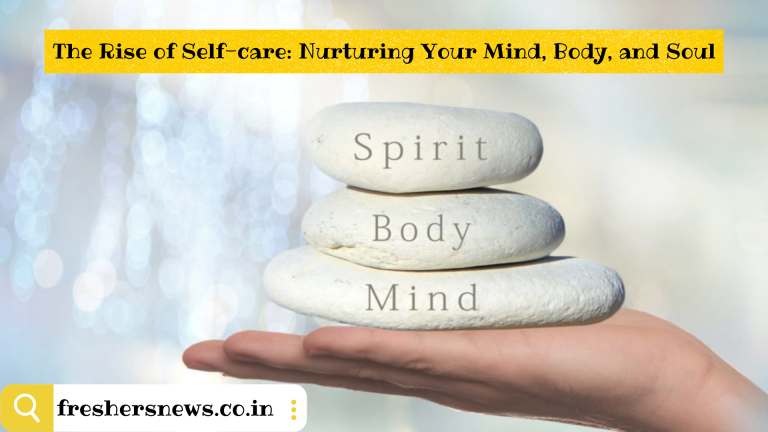For a good cause, self-care has recently become an increasingly popular subject in mainstream media. Many people recognize the negative impacts of generational traumas and capitalism on their health and well-being (such as destructive cycles, stress, and tiredness). As a result, of the rise of self-care, they’ve started researching and incorporating self-care techniques into their daily routine.
However, self-care is critical for our overall well-being and pleasure. Self-care is the practice of nourishing our mind, body, and soul, and it can help us feel more robust, balanced, and energized.
Taking care of our physical health is a critical component of self-care. This includes making time for exercise, eating nutritious food, and sleeping sufficiently.
Self-care is a necessary component of a meaningful and joyful existence. We may become more robust, balanced, and energized by cultivating our mind, body, and spirit, and so be more ready to face the challenges of daily life. So, it is necessary to make time for self-care and nurture your mind, body, and soul to see its positive influence on your life and the lives of others around you.

Here are the top 8 ways to self-care and nurture your mind, body, and soul.
1. EXERCISE
Exercise relieves stress, improves mood, and increases energy, not to mention the cardiovascular advantages. Believe it or not, you can work out almost anywhere and anytime. It does not have to take place at the gym. It does not have to be a regularly scheduled class. And it only has to be a few minutes every day. Every action matters. I urge patients to consider an activity they like. Consider how you might incorporate that delightful activity into your life: perhaps you can ride your bike to work, take your kids on a short walk, or get the whole family to rake leaves with you.
Regular exercise keeps your mind healthy and engaged. It relieves stress, enhances memory, and elevates your mood. Take the stairs instead of the lifts. Stretch your body and do yoga asanas regularly.

2. WRITE A LOVE NOTE
Being a firm believer in the nurturing practice of expressing love to oneself and others! I will suggest that writing love letters is a fun and nurturing method to promote love and goodwill worldwide. Begin by creating a love note to yourself in which you express your love and admiration for yourself. This may be difficult for some, but it will be a therapeutic experience and a wonderful reminder when you feel low or ill. Next, add a love letter to a treasured family member or friend, telling them how much they mean to you.
You may take this practice outside by painting love note signs and leaving them in parks, on nature paths, or anywhere else in public to convey love and optimism. Some of the signs I’ve painted say things like, you are loved; you matter; nurture serenity and joy; hope; trust in possibilities, and you are enough. Being creative and encouraging people with love letters is profoundly therapeutic for my mind, body, and soul!

3. MEDITATE
Meditation has been shown in studies to have tremendous benefits for the mind, body, and spirit. Meditation has been shown in recent studies to be as effective as medication in reducing depression and lowering the stress response in the body. For thousands of years, people have used meditation to nourish their spirits. Additionally, when we regularly meditate, we become more self-aware and thus make healthier choices for ourselves.
Include the following self-nurturing practices throughout your day, whether you are a seasoned mediator or just starting: Pause and intentionally breathe in and out a few times. Check in with your body for any discomfort or tension you may feel; return to your breath for a few cycles; then notice your thoughts and, without chasing them, label them: planning, worrying, regretting, etc.; then return to your breath for a few more cycles. Meditation helps you connect with your mind, body, and spirit while nurturing flourishing health.

4. GET OUT IN NATURE
Most individuals remark that being out in nature gives them a great sense of tranquility and that it effortlessly nurtures their minds, bodies, and souls. Nature links us to our entire selves and urges us to be in the now. Observing the clouds, listening to the birds, and taking in the beauty all around us instill a sense of thankfulness and genuine appreciation for our lives. We frequently exercise in nature, which also contributes to our good health. Even if you live in a city, going for a stroll outside and observing the trees, plants, and life around you may refresh and invigorate you!
Ecopsychology, a growing field of study, shows that spending time in nature helps the body, mind, and spirit.

5. GRATITUDE PRACTICES
Recognizing the gifts in our lives is highly nutritious for our brains, bodies, and spirits. Make it a habit to express gratitude to yourself, your family, and your friends. There are several methods to show appreciation, including writing, having a thankfulness jar in your home or workplace for individuals to write down what they are grateful for and then placing it in the jar, and sharing your gratitude during meals, meetings, and other events. Consider how your mind, body, and spirit respond when you face the world with a thankful heart. Gratitude promotes flourishing health!
Gratitude is about appreciating the little things that help you overcome difficult and big times. Practicing thankfulness provides mental tranquility. Take a few minutes each morning to consider five things you are thankful for.
Send a thank-you message to someone who has lately made you smile.
Before going to bed, write down three positive events from your day.

6. DO CREATIVE ACTIVITY
Creativity, like being in nature, connects and nurtures our brains, bodies, and spirits delightfully and effortlessly. Using our creativity to express ourselves is a fantastic self-care practice. Drawing, coloring, collage, painting, constructing an altar, decorating your house or workplace, gardening, writing, dancing, singing, and/or playing an instrument can foster your creativity. You don’t have to identify as an artist to cultivate your creativity. You must allow yourself to express your truth and beauty!

7. EAT WELL
That means eating well. The number of studies supporting a whole-food, plant-based diet for human health is nearly as high as that of studies supporting exercise. Avoid inflammatory, sugar-spiking, insulin-releasing meals such as processed carbs (added sugars and flour-based products). Look for items that grow on plants or trees. The more vibrant the fruits and vegetables, the more vitamins, minerals, and antioxidants they contain; hence, they are healthier. Vitamins and other supplements do not function as effectively. You’re not becoming vegetarian to save your life, are you? Got it. Simply incorporate colorful fruits and vegetables into your diet whenever possible. We don’t need to be flawless, but the more plant-based our diets are, the better.

8. SLEEP WELL
Aim for a restful night’s sleep. While this will vary from person to person, it is usually around eight hours. It’s tempting to stay up late to do those last-minute home duties or respond to emails, but the world won’t end if the laundry is left to dry or the dishes are piled up in the sink. Irritability, poor memory, reduced reflexes, and reduced response time (think: vehicle accidents!) are all symptoms of sleep deprivation, and chronic sleep loss can contribute to depression and anxiety. Make a quick and easy nighttime ritual. Relaxation can be achieved by stretching, yoga, prayer, or reading a book. However, avoid using your smartphone, tablet, or laptop, as the light interferes with and disrupts the natural start of sleep.

Conclusion
Self-care is a vital component of having a balanced and healthy life. Prioritizing your well-being and adopting self-care practices into your daily routine may help you improve your physical, mental, and emotional health, increase your attention and productivity, build relationships, and nurture your body, mind, and soul. Remember that self-care is not a luxury but a necessity for living a whole and healthy life.
Empower yourself with these eight caring practices to embrace feeling vibrantly healthy. Try one daily and note how it affects your overall health and wellness.
May you embrace self-cultivation to support your robust health and live genuinely in truth and beauty, nurturing peace and pleasure in the world from the inside out!
Frequently asked questions on Self-care-
Q. What is the most common type of self-care?
A. Americans’ most prevalent self-care behaviors include sleeping, listening to music, drinking water, resting, and walking.
Q. What are the advantages of self-care?
A. Engaging in a self-care practice has been professionally proven to lessen or eliminate anxiety and sadness, reduce stress, boost happiness, and more. It can help you adjust to changes, create connections, and recover from disappointments.
Q. Is self-care related to self-love?
A. Self-love is caring for one’s needs rather than sacrificing one’s well-being to please others. Self-love entails refusing to accept less than you deserve. Self-love may mean various things to different people since we all have different ways of caring for ourselves.
Q. Is it selfish to take care of oneself?
A. Self-care is performed to care for oneself rather than harm or take from others. Being selfish implies a willingness to take advantage of others, typically to their cost. Self-care is about restoring your resources without draining someone else’s.
Q. What are the most challenging aspects of self-care?
A.1. Time factor (lack of time in our hectic lives)
2. Guilt factor (we feel unproductive, selfish, or indulgent)
3. Needs factor (not genuinely working to nourish or sustain oneself).



0 Comments